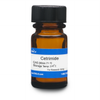Cetrimide is a bactericidal cationic surfactant used against Gram-positive bacteria. It is commonly used in selective media to isolate Pseudomonas aeruginosa. Cetrimide is an active ingredient in Cetavlon, a detergent used in plant surface sterilization protocols. It is also used in molecular biology protocols as a detergent to isolate high molecular weight DNA.
Cetrimide is freely soluble in water.
This product is considered a dangerous good. Quantities above 1 g may be subject to additional shipping fees. Please contact us for questions.
| Microbiology Applications | Cetrimide is often used in selective media (Cetrimide Agar Base) to selectively isolate and identify Pseudomonas aeruginosa. Enterococcus faecalis can grow as a biofilm in oral cavities in tooth canals. Using a MBEC-high-throughput device to study these types of biofilms, authors found that an irrigating solution of Cetrimide was able to eradicate the bacteria (Arias-Moliz et al, 2010). |
| Spectrum | Cetrimide is active against Gram-positive and Gram-negative bacteria. |
| Plant Biology Applications |
Cetrimide is an active ingredient in Cetavlon, a detergent and antiseptic used in plant and tree tissue culture prior to surface sterilization. A commercially important tropical fruit tree in India is the blackplum (Syzygium cuminii L ). Seeds were treated with 1% (v/v) Cetavlon prior to surface sterilization (Yadav, 1989). Newly developed leaves from apical portions of guava plants were treated with 1% (v/v) Cetrimide prior to surface sterilization (Amin, 1986). Cetrimide can be used as a cationic detergent to isolate high molecular weight plant DNA. |
| References |
Amin MN and Jaiswal VS (1987) Rapid clonal propagation of guava through in vitro shoot proliferation on nodal explants of nature trees. Plant Cell Tissue Organ Cult. 9:235-243 Arias-Moliz MT, Ferrer-Luque CM, Gonzalez-Rodriguez MP, Verderrama MJ and Baca P (2010) Eradication of Erterococcus faecalis biofilms by Cetrimide and Chlorhexidine. J. Endodontics. 36(1):87-90 Yadav U, Lal M and Jaiswal VS (1990) In vitro micropropagation of the tropical fruit tree Syzygium cuminii L.. Plant Cell Tiss. Organ Cult. 21(1):87-92 |



